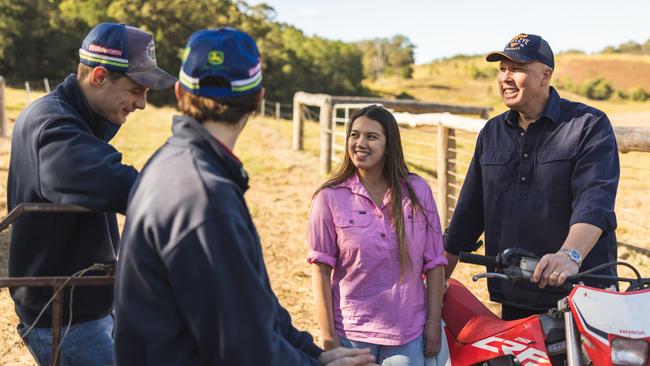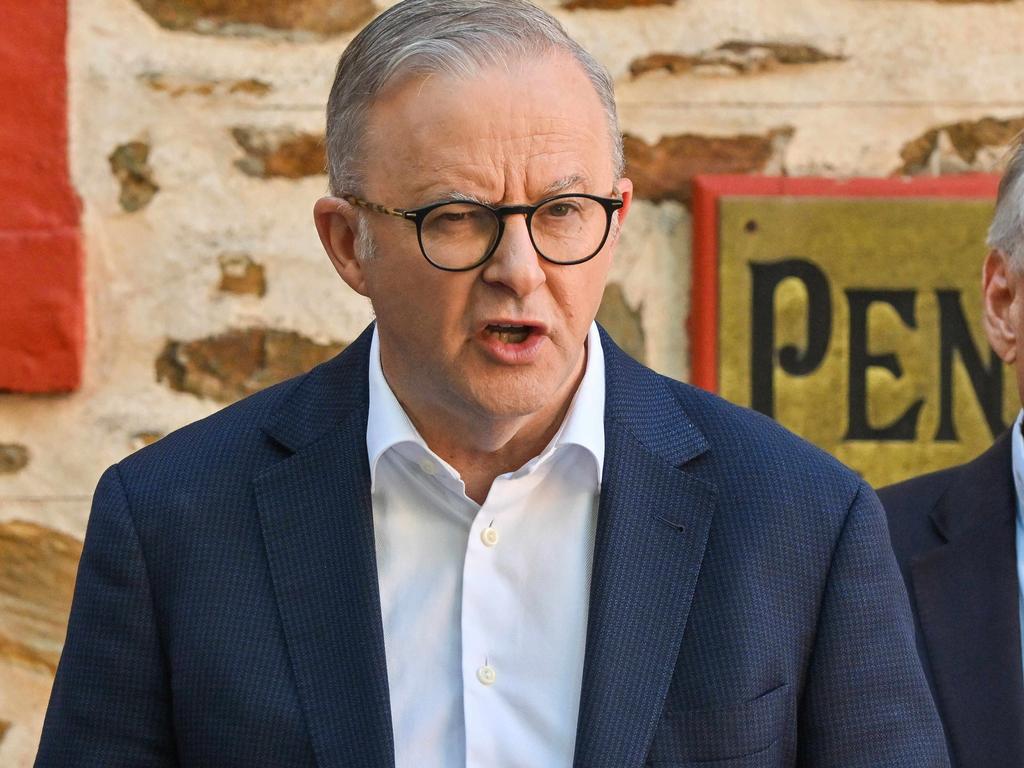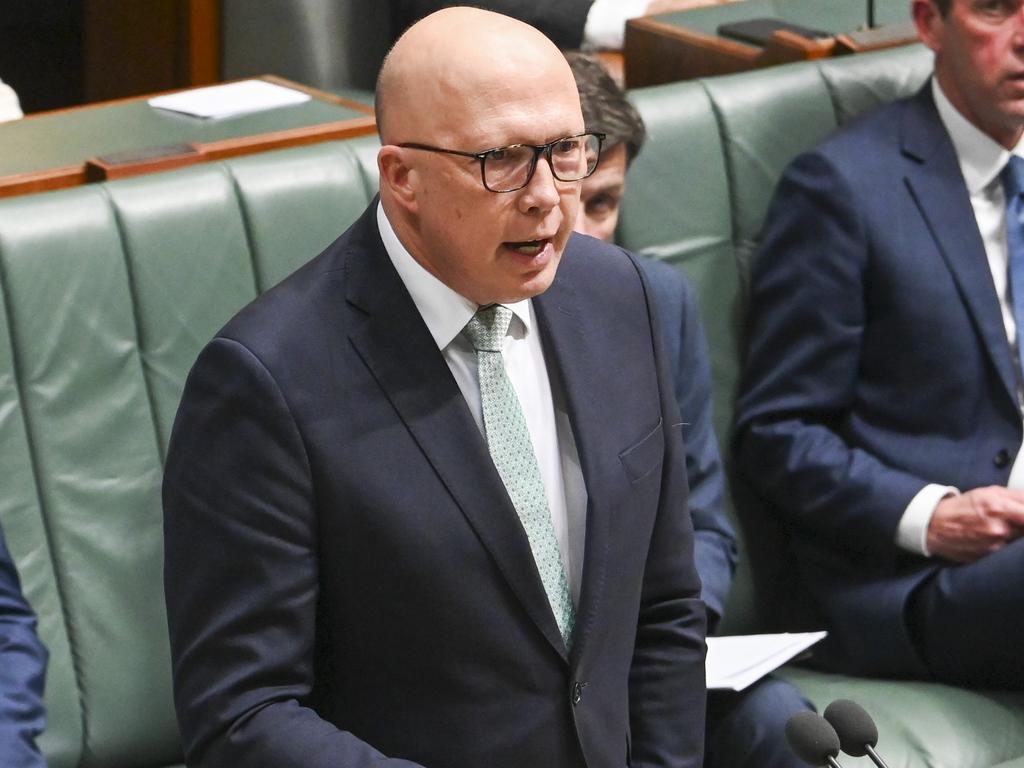Peter Dutton puts carbon emissions target on Labor’s back
Peter Dutton will oppose Labor’s 43 per cent carbon emissions reduction target by 2030 at the next election, warning it is unachievable and will destroy industries like agriculture.

Peter Dutton will go to the next election opposing Labor’s 43 per cent carbon emissions reduction target by 2030 but keeping to zero emissions by 2050, opting for a radically different energy policy to Anthony Albanese that prioritises more gas in the short term and nuclear in the long term.
The Opposition Leader declared there was “no sense in signing up to targets you don’t have any prospect of achieving” and promised the Coalition in government would not “destroy” agriculture, manufacturing and investment nor create sovereign risk with trading partners by agreeing to unachievable climate change targets.
Mr Dutton said he would take a different gas policy from Labor to the next election to ensure a successful shorter-term transition to renewable power and clarified that nuclear power, which would not be delivered until the 2040s, would be aimed at achieving the net-zero target by mid-century.
In an interview with The Weekend Australian to mark his second year as leader of the Liberal Party, Mr Dutton said: “They (Labor) just have no hope of achieving the targets and there’s no sense signing up to targets you don’t have any prospect of achieving.
“We’re not going to destroy agriculture. We’re not going to stifle investment. We’re already seeing investment being withdrawn. We’re not going to create sovereign risk with our export partners, as Labor is doing with Japan and Korea.”
Mr Dutton said there had “never been any doubt in my mind that gas is absolutely essential”.
“And without it, there’ll be catastrophic failure in the energy market over the next decade,” he said. “You can’t have the Prime Minister saying we aren’t going to have coal, we aren’t going to have gas and were not going to have nuclear power and we are going to keep the lights on – that’s just fantasy. We now have a debate about energy which I think we can win.”
Mr Dutton said the next election, due by May next year, would come down to basic issues of economic management, national security and law and order.
He said the Prime Minister had failed to lead by example and come out more strongly against those promoting hate and anti-Semitism in society.
If a firmer stand had been taken “we would have seen arrests and we would have seen the ability for people to protest peacefully, but not with the incitement and the rage that we’ve seen in the university campus demonstrations”, he said.
“Nobody’s been arrested for hundreds of thousands of dollars worth of damage to the offices of members of parliament,” Mr Dutton said.
“I think the (police) commissioners take their lead from the premiers and from the police ministers and from the Prime Minister.
“I think there has been an approach of just keeping the peace, not taking sides because this is just another Middle East thing. Whereas I think the approach should have been to enforce the rule of law without fear or favour.”
On taxation, Mr Dutton indicated that the Coalition’s policy, which would not alter Labor’s tax cuts schedule that comes in on July 1, would be limited by funds available in the budget.
But he elevated economic reform across the federation as a longer-term aspiration that he would champion as prime minister, saying it was critical to reduce red tape and drive down costs for businesses.
“I think there’s a very compelling argument for the federation debate to be re-enlivened,” Mr Dutton said.
“I think we should be talking more about how we can eliminate efficiencies and waste within a three layers of government model.
“That is a debate that we would willingly join if the Prime Minister were to have any appetite.
“And in government it’s a debate that I want to start. Because we are over-governed (and) over-regulated.”
Mr Dutton said he believed the Coalition’s “superior ability to manage the economy, given that cost of living is so relevant and important to Australians” would appeal to all voters, including those living in more affluent seats held by the seven teal independents – once blue-ribbon Liberal electorates – as well as outer-suburban areas.
He said his two years as Opposition Leader, including his part in the defeat of the Indigenous voice referendum last October, had given people the chance to “reconsider” him as a leader and not accept the way Labor had painted him as an angry and negative person.
“My judgment is that people want a leader with strength and with a positive outlook and vision for our country, which we’re in the process of outlining,” Mr Dutton said.
“People have allowed themselves to reconsider who they thought me to be or who Labor had framed me as.
“I think what Labor says is at odds with who people see me to after being able to watch me in a different role for the last two years and dealing with the breadth of issues starting with the voice and other economic and security issues.”
On immigration, Mr Dutton reaffirmed his commitment to cutting the record intake and encouraging skilled workers.
But he also made clear the Coalition would elevate the need to accept migrants who shared Australian values, declaring this principle would be central to his approach to the prime ministership if he won office.
“There are millions of people who want to come to our country, be law-abiding, help their neighbours, not rob them, go to work, not turn up to a Centrelink office,” the Liberal leader said.
“And we shouldn’t be ashamed of saying that.”
Addressing the housing shortage, Mr Dutton condemned Labor for giving free rein to the CFMEU, which he said was “running unbridled through the building sector” and ultimately “bleeding into” residential construction and pushing up costs.
He made clear a key plank of the Coalition’s workplace relations policy offering going into the next election would be to restore a tough cop on the beat by reviving the Australian Building and Construction Commission.
Mr Dutton also indicated the likely end of the religious freedom bill being negotiated with the Albanese government because the Coalition would not support proposals that weakened the protections already in place for religious schools, hospitals, aged care and welfare agencies.







To join the conversation, please log in. Don't have an account? Register
Join the conversation, you are commenting as Logout